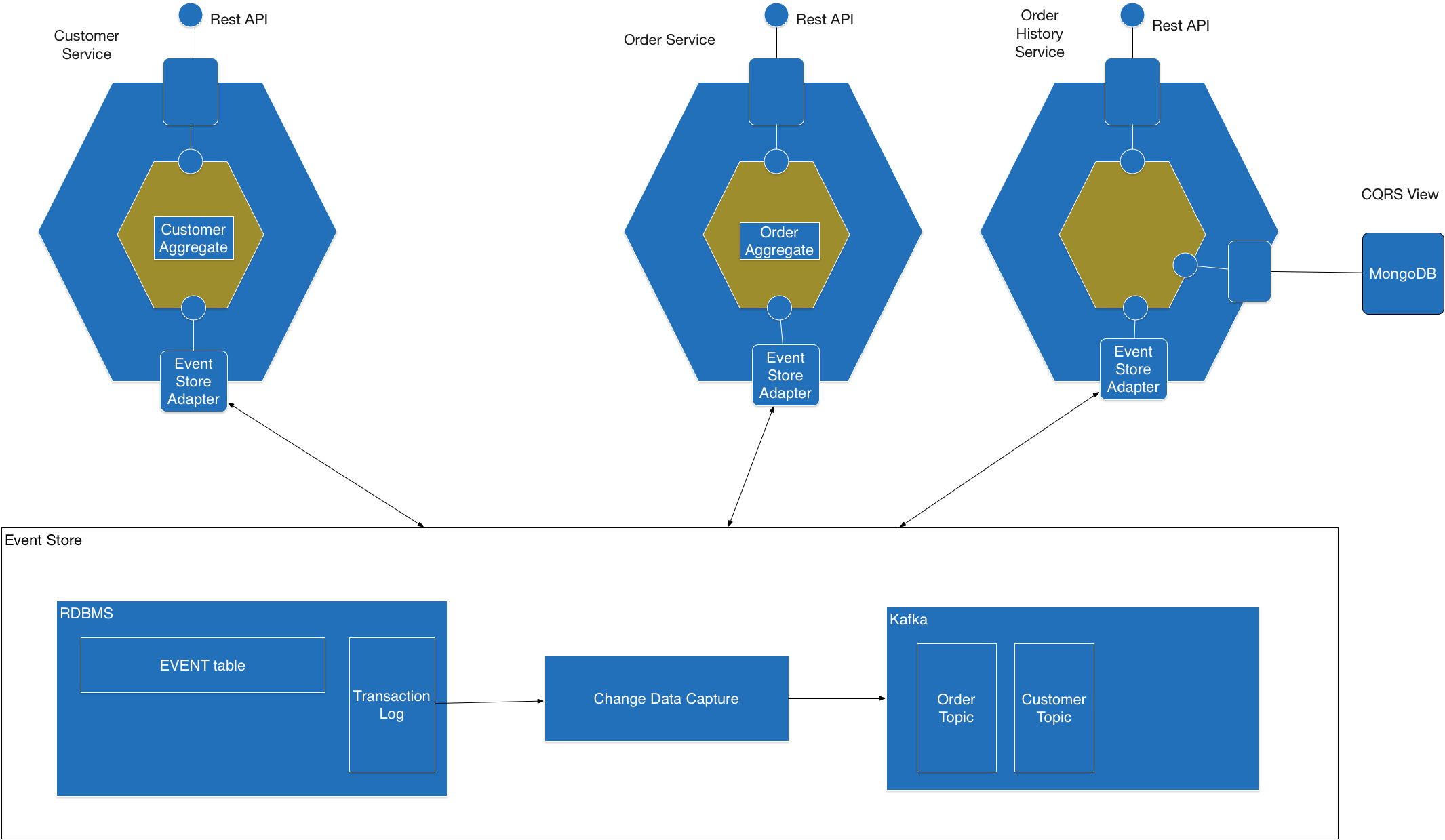Eventuate™ Local is the on-premise, open source version of Eventuate™, which is a platform for developing transactional business applications that use the microservice architecture. Eventuate provides an event-driven programming model for microservices that is based on event sourcing and CQRS. Eventuate™ Local has the same API as the SaaS version but uses a SQL database to persist events and Kafka as the publish/subscribe mechanism.
Eventuate Local consists of:
-
A framework for developing (microservice-based) applications.
-
An event store consisting of a SQL database (currently MySQL) and Kafka.
The framework persists events in an EVENTS table in the SQL database and subscribes to events in Kafka.
A change data capture component tails the database transaction log and publishes each event to Kafka.
There is a Kafka topic for each aggregate type.
Eventuate Local has a change data capture (CDC) component that
-
tails the MySQL transaction log
-
publishes each event inserted into the
EVENTStable to Kafka topic for the event’s aggregate.
The CDC component runs either embedded within each application or as a service cdcservice.
Don’t hesitate to create an issue or see
Take a look at the available paid support options.
To use Eventuate Local you need to
-
Create
EVENTandENTITIEStables in a MySQL database. -
Run Apache Zookeeper, Apache Kafka and the optional
cdcservice -
Use the Eventuate Local artifacts in your application.
The easiest way to get started is to run a set of Docker containers using Docker Compose as described below.
This is the fastest way to get started with Eventuate Local.
You must first set the environment variable DOCKER_HOST_IP to the IP address of the machine running Docker.
For example, if you are running Docker Machine on Mac/Windows this would be the IP address of the VirtualBox VM.
Please note that you cannot set DOCKER_HOST_IP to localhost since that will not resolve to the correct IP address within a Docker container.
Next, you can run the Docker containers. First, copy docker-compose-eventuate-local.yml to your project. Then, launch the Docker containers by running the following command:
docker-compose -f docker-compose-eventuate-local.ymlThis command creates the following containers:
-
Apache Zookeeper - used by both the change data capture component and Kafka
-
Apache Kafka - message broker
-
MySQL - MySQL database that has the eventuate schema already defined
-
cdcservice - the change data capture component
For convenience, you might want to add the contents of this file to your project’s docker-compose.yml file.
In order for your Sprint Boot application to use Eventuate Local you need to set the following application properties:
spring.datasource.url=jdbc:mysql://${DOCKER_HOST_IP}/eventuate
spring.datasource.username=mysqluser
spring.datasource.password=mysqlpw
eventuateLocal.kafka.bootstrapServers=$DOCKER_HOST_IP:9092
eventuateLocal.zookeeper.connectionString=$DOCKER_HOST_IP:2181
eventuateLocal.cdc.dbUserName=root
eventuateLocal.cdc.dbPassword=rootpassword
A convenient way to do that is to set the corresponding OS environment variables:
export SPRING_DATASOURCE_URL=jdbc:mysql://${DOCKER_HOST_IP}/eventuate
export SPRING_DATASOURCE_USERNAME=mysqluser
export SPRING_DATASOURCE_PASSWORD=mysqlpw
export SPRING_DATASOURCE_DRIVER_CLASS_NAME=com.mysql.cj.jdbc.Driver
export EVENTUATELOCAL_KAFKA_BOOTSTRAP_SERVERS=$DOCKER_HOST_IP:9092
export EVENTUATELOCAL_CDC_DB_USER_NAME=root
export EVENTUATELOCAL_CDC_DB_PASSWORD=rootpassword
export EVENTUATELOCAL_ZOOKEEPER_CONNECTION_STRING=$DOCKER_HOST_IP:2181
You can do that by running the set-env.sh bash script:
If you are using Gradle then please specify the following in gradle.properties:
eventuateLocalVersion=0.11.0.RELEASEand instead of the Eventuate HTTP/STOMP artifacts, specify the following:
compile "io.eventuate.local.java:eventuate-local-java-jdbc:${eventuateLocalVersion}"
compile "io.eventuate.local.java:eventuate-local-java-embedded-cdc-autoconfigure:${eventuateLocalVersion}"For more information about developing applications with Eventuate Local see the Getting Started guide.
You need to configure your application’s containers to connect to the Eventuate MySQL, Kafka and Zookeeper containers.
You can do that using the following in your project’s docker-compose.yml file using links and environment:
mycontainer:
...
links:
- mysql
- kafka
- zookeeper
environment:
SPRING_DATASOURCE_URL: jdbc:mysql://mysql/eventuate
SPRING_DATASOURCE_USERNAME: mysqluser
SPRING_DATASOURCE_PASSWORD: mysqlpw
SPRING_DATASOURCE_DRIVER_CLASS_NAME: com.mysql.cj.jdbc.Driver
EVENTUATELOCAL_KAFKA_BOOTSTRAP_SERVERS: kafka:9092
EVENTUATELOCAL_ZOOKEEPER_CONNECTION_STRING: zookeeper:2181
EVENTUATELOCAL_CDC_DB_USER_NAME: root
EVENTUATELOCAL_CDC_DB_PASSWORD: rootpasswordNote: in order for this to work you have either copied the container definitions from docker-compose-eventuate-local.yml to you docker-compose.yml file or you are running docker-compose with multiple -f arguments:
docker-compose -f docker-compose-eventuate-local.yml -f docker-compose.yml up -dThe Eventuate example applications support both Eventuate and Eventuate Local.
To build an example with Eventuate Local, use this command:
./gradlew -P eventuateDriver=local assembleTo start the Docker Containers with Eventuate Local run this command:
docker-compose -f docker-compose-eventuate-local.yml up -dThe docker-compose-eventuate-local.yml file defines the application containers and the Eventuate Local containers and links them appropriately.



